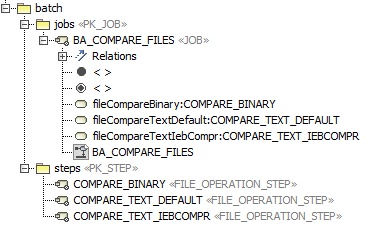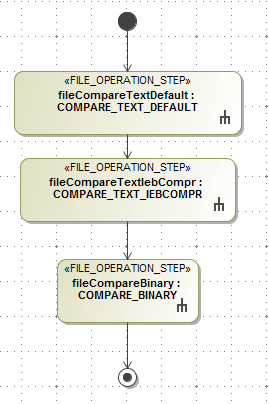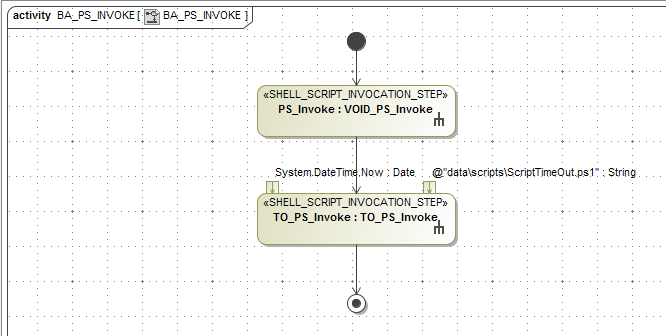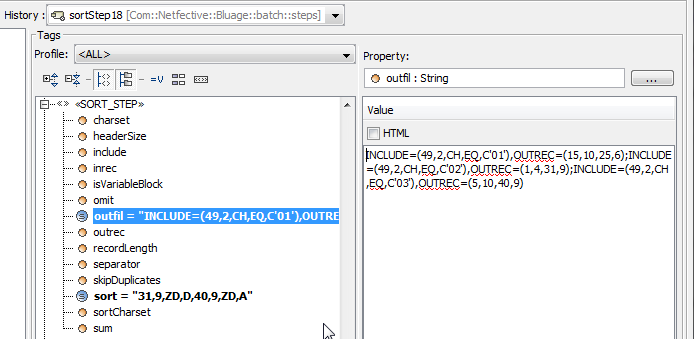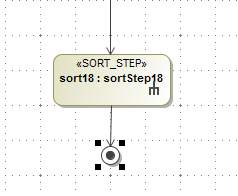Global Notes:
5.X products are parts of the “Blu Age II – Legacy to cloud” product family, built on Kepler (Eclipse 4.3);
Product documentation is available at http://wikimod.bluage.com/mediawiki/index.php/Main_Page ;
Starting with version 5.0, a new license management has been introduced, requiring the use of a new License Server (shipped separately – see corresponding documentation for details);
5.X versions rely on the launch configurations mechanism introduced with the 4.X product series in replacement of the previous workflow mechanism. Migrating from the 3.X workflow to the 5.X launch configuration is described in a dedicated guide.
![[Note]](common/images/admon/note.svg) | Note |
|---|---|
This version of Cobol2SummerBatch introduces new features that require the version 1.1.0 of SummerBatch (which is the default version for newly created BluAge projects with this product). This new release of SummerBatch is available on nuget (see https://www.nuget.org/packages/SummerBatch/); The corresponding source code can be browsed at https://github.com/SummerBatch/SummerBatch. |
The FileUtilsTasklet tasklet in SummerBatch provides a new mode : "Compare", that can be used to perform either text based or binary file comparison;
To provide access to these new facility, some additional elements have been introduced in the BluAge batch UML profile :
FileOperationMode.COMPARE: this new litteral has been added to the
FileOperationMode enumeration. This new value can be picked to populate the mode
tagged value of the "FILE_OPERATION_STEP" stereotype (see the Usage paragraph below).
FileComparisonMode enumeration: this enumeration lists the supported comparison
mode for the FileUtilsTasklet;
- TEXT : for text-based comparison
- BINARY : for binary comparison
EqualityComparerType enumeration : this enumeration lists the
supported text-based comparison modes (only taken into account if
TEXT has been selected as FileComparisonMode)
- DEFAULT : standard text comparison (using SequenceEqual on lines of compared text files)
- IEBCOMPR_LIKE : similar to z/OS IEBCOMPR comparison
New tagged values for the "FILE_OPERATION_STEP" stereotype :
-
fileComparisonMode : to be picked in the FileComparisonMode enumeration detailed above;
Will only be taken into account if the mode is
FileOperationMode#COMPARE; -
equalityComparer : to be picked in the EqualityComparerType enumeration detailed above;
Will only be taken into account if the mode is
FileOperationMode#COMPAREand if the fileComparisonMode isFileComparisonMode#TEXT.
Usage
Using the compare mode is similar to other "FILE_OPERATION_STEP" usages : simply create the dedicated steps, using the "FILE_OPERATION_STEP" stereotype:
and set the tagged values to suit your needs:
then use them in the proper job diagram:
The result of the file comparison is stored in the ExitStatus (the FileUtilsTasklet implements the
IStepExecutionListener interface and uses the AfterStep method to return the ExitStatus). If the compared files are equals, the
ExitStatus will be ExitStatus.Completed, otherwise the ExitStatus will be custom with "FILESNOTEQUAL" as ExitCode.
Feeding the steps with the proper files to be compared is achieved through the standard Settings.config mechanism; The key to be used is having the form "(Job Name).(Step Name in Job).sources" and the value to be given is a list of two semi-colon separated file paths pointing at the files to be compared.
e.g. : for the sample shown above, here is the corresponding Settings.config file content :
<?xml version="1.0" encoding="utf-8" ?>
<appSettings>
<add key="BA_COMPARE_FILES.fileCompareTextDefault.sources" value="data/inputs/text1.txt;data/inputs/text2.txt" />
<add key="BA_COMPARE_FILES.fileCompareTextIebCompr.sources" value="data/inputs/ieb1.txt;data/inputs/ieb2.txt" />
<add key="BA_COMPARE_FILES.fileCompareBinary.sources" value="data/inputs/bin1.zip;data/inputs/bin2.zip" />
</appSettings>
In version 1.1.0 of SummerBatch, support for powershell scripts invocation has been introduced, using the
Summer.Batch.Core.Step.Tasklet.PowerShellTasklet (and some other related code artifacts). To be able to use that feature,
some additions neeeded to be made to the Blu Age batch UML profile.
"SHELL_SCRIPT_INVOCATION_STEP" stereotype has been introduced to be used on steps dedicated to invoke PowerShell scripts:
- timeOut: defines in milliseconds the timeout to be applied to the script invocation;
- timeOutBehaviour: used to set how the step will behave when the timeout limit is reached;
The value is to be picked in the new
TimeOutBehaviourenumeration :SET_EXIT_STATUS_TO_FAILED: theExitStatusfor the Step will be setExitStatus.Failedwhich permits to add some decision handling on whether the running job should be stopped or not.THROW_EXCEPTION: throwing anExceptionthat will force the running job to stop.
Usage
Define one or several steps holding the "SHELL_SCRIPT_INVOCATION_STEP" stereotype,
and use them in the proper job diagram:
![[Note]](common/images/admon/note.svg) | Note |
|---|---|
|
Specifying the script to be invoked by the PowerShellTasklet and the timeout to be used is achieved by filling the Settings.config file; The keys have the form :
- (Job Name).(Step Name in Job).SCRIPT: to point at the script file path;
- (Job Name).(Step Name in Job).TIMEOUT: to set the timeout value (in milliseconds);
E.g. - Here is the sample Settings.config file content for the sample shown above :
<?xml version="1.0" encoding="utf-8" ?> <appSettings> <add key="BA_PS_INVOKE.PS_Invoke.SCRIPT" value="data/scripts/ScriptExitStatus.ps1" /> <add key="BA_PS_INVOKE.PS_Invoke.TIMEOUT" value="100000" /> <add key="BA_PS_INVOKE.TO_PS_Invoke.SCRIPT" value="data/scripts/ScriptTimeOut.ps1" /> <add key="BA_PS_INVOKE.TO_PS_Invoke.TIMEOUT" value="12000" /> </appSettings>
![[Warning]](common/images/admon/warning.svg) | Warning |
|---|---|
For technical constraints, the ambient transaction needs to be suppressed before invoking the PowerShell script. Therefore, any required transaction support should be explicitely handled directly by the PowerShell script. |
The Summer.Batch.Extra.Sort.SortTasklet used by "SORT_STEP" sterotyped steps is now able to handle
multiple output files (vs. only one output file for SummerBatch version 1.0.0);
A new tagged value, named 'outfil' has been introduced in the "SORT_STEP" stereotype. This tagged value has to be filled with relevant information to activate the multiple outputs facility. Its content has to be a semi-colons separated list of configurations.
Each configuration is a comma-separated list of Commands, specified by the following syntax :"<COMMAND>=(<PARAMETERS>)" where
COMMAND is the command name and PARAMETERS, its parameters.
The outfil tagged value support three commands: INCLUDE and OMIT to filter records, and OUTREC to format them.
Each command support the same syntax as described in the SummerBatch documentation related section.
![[Note]](common/images/admon/note.svg) | Note |
|---|---|
If both the 'outrec' and 'outfil' tagged values are set for a given "SORT_STEP", the 'outrec' value will be ignored when generating code artifacts. |
Usage
Stereotype a step with the "SORT_STEP" stereotype, feeding the 'outfil' tagged value with the convenient configurations:
and use it in the proper job diagram :
To match the given 'outfil' value, the outputs specification has to be given as a semi-colon separated list of file paths, in the Settings.config file.
<?xml version="1.0" encoding="utf-8" ?> <appSettings> ... <add key="BA_SORT_FILE.sort18.inputFiles" value="data/inputs/sort18.txt" /> <add key="BA_SORT_FILE.sort18.outputFile" value="data/outputs/sort18-1.txt;data/outputs/sort18-2.txt;data/outputs/sort18-3.txt" /> </appSettings>
![[Warning]](common/images/admon/warning.svg) | Warning |
|---|---|
The number of given output files has to match the number of defined configurations in the 'outfil' value. Failing to do so will raise an early error at run time, preventing the proper job execution. |
When modeling a service interface modelized properties with a default value will be generated as constants in the corresponding code artifact.
When modeling a business object modelized properties with a default value and holding the "constant" stereotype will be generated as constants in the corresponding code artifact.
e.g. : modelized constants in a service interface
and here is the corresponding generated C# code snippet :
...
namespace Com.Netfective.Bluage.Services.CompositeEbcdicReader
{
/// <summary>
/// Service ServiceReadEbcdic
/// </summary>
public class ServiceReadEbcdic : AbstractService
{
private const string testConstant = "This is a test constant";
private const int testConstantNum = 42;
...
e.g. : modelized constants in a business object
and here is the corresponding generated C# code snippet :
...
using Com.Netfective.Bluage.Common.Tags;
using System;
namespace Com.Netfective.Bluage.Business.Batch.Datasourcewriter.Bo
{
/// <summary>
/// Entity DatasourceWriterBO.
/// </summary>
[Tag("DataAccess")]
[Serializable]
public class DatasourceWriterBO
{
...
/// <summary>
/// Constant Property DefEmailAddress.
/// </summary>
public const string DefEmailAddress = "user@mycompany.com";
...
Setting the useVirtualMethods property to true for the com.netfective.bluage.dotnet.batch BSP in the BluAge launch configuration
will ensure that all public and protected methods will also be marked as virtual (whenever possible), permitting to use performance
auditing processes relying on code instrumentation mechanisms.
![[Note]](common/images/admon/note.svg) | Note |
|---|---|
The useVirtualMethods property defaults to true. |
The Tag custom C# attribute will be applied to any generated C# artifact code provided the originating UML node has
been properly tagged using the "UnityTag" stereotype (in the BluAge service UML profile).
The "UnityTag" holds a single tagged value, named "value" that contains a free-form String, used to identify the "domain of interest" for a given element. The content of the "value" tagged value will be used "as-is" in the generated code.
e.g. : tagging the "EmployeeService" with the "UnityTag" stereotype, valued with "BatchService" string
...
namespace Com.Netfective.Bluage.Services.Employee
{
/// <summary>
/// Service EmployeeService
/// </summary>
[Tag("BatchService")]
public class EmployeeService : AbstractService
{...Calls to logger are now delegated to a custom logger mechanism (see generated Log.cs and LogManager.cs classes);
The loggerFactory, loggerImport and logger properties for the com.netfective.bluage.dotnet.batch BSP in the BluAge launch configuration
can be used to customize the underlying used logger framework and the way the loggers are being named in the C# generated code.
Current default values are:
- loggerFactory:
NLog.LogManager - loggerImport:
NLog.Logger - logger:
Logger
The following issues have been fixed in this version
PLTC-3264: Badly formed generated documentation for ebcdic write operation.
PLTC-3272: Duplicate declaration of a shared dependency amongst pre/post-processors in an ExecutionListener.
PLTC-3273: Unsupported scalar return type for "sql_operation".
Global Notes:
5.X products are parts of the “Blu Age II – Legacy to cloud” product family, built on Kepler (Eclipse 4.3);
Product documentation is available at http://wikimod.bluage.com/mediawiki/index.php/Main_Page ;
Starting with version 5.0, a new license management has been introduced, requiring the use of a new License Server (shipped separately – see corresponding documentation for details);
5.X versions rely on the launch configurations mechanism introduced with the 4.X product series in replacement of the previous workflow mechanism. Migrating from the 3.X workflow to the 5.X launch configuration is described in a dedicated guide.
This version of Cobol2SummerBatch use the version 1.1.2 of SummerBatch (which is the default version for newly created BluAge projects with this product). This new release of SummerBatch is available on nuget (see https://www.nuget.org/packages/SummerBatch/); The corresponding source code can be browsed at https://github.com/SummerBatch/SummerBatch.
The following issues have been fixed by this new framework version:
PLTC-3569 : Some instances where different writers on the same file did not work are now fixed.
PLTC-3574 : Some instances where a template writer produced empty files are now fixed.
PLTC-3583 : Some instances where a template writer wrote on top of the file instead of the bottom are now fixed.
The following issues have been fixed in this version:
PLTC-3544: An incorrect
usingclause was removed from the template writers.PLTC-3559: The
decimaltype has been added.PLTC-3563: Some missing writer operations were added in the configuration.
PLTC-3701: Lists of VOs are now correctly generated.
PLTC-3704:
".equals"has been replaced with".Equals".PLTC-3801: Duplicate entries in CSPROJ files have been removed.
The following improvements have been added in this version:
PLTC-3582 : Services can now have attributes.
PLTC-3588 : Collections can now be used in Sql Query parameters.
PLTC-3593 : Operations with
<<template_element>>stereotype can now be used to supply custom implementation.
Global Notes:
5.X products are parts of the “Blu Age II – Legacy to cloud” product family, built on Kepler (Eclipse 4.3);
Product documentation is available at http://wikimod.bluage.com/mediawiki/index.php/Main_Page ;
Starting with version 5.0, a new license management has been introduced, requiring the use of a new License Server (shipped separately – see corresponding documentation for details);
5.X versions rely on the launch configurations mechanism introduced with the 4.X product series in replacement of the previous workflow mechanism. Migrating from the 3.X workflow to the 5.X launch configuration is described in a dedicated guide.
This version of Cobol2SummerBatch use the version 1.1.3.2 of SummerBatch (which is the default version for newly created BluAge projects with this product). This new release of SummerBatch is available on nuget (see https://www.nuget.org/packages/SummerBatch/); The corresponding source code can be browsed at https://github.com/SummerBatch/SummerBatch.
The following issues have been fixed by this new framework version:
PLTC-3820 : GDG versions in Summer Batch now start with version 1 instead of version 0.
PLTC-3830 : Some instances where holds on a created file were not correctly released are now fixed.
PLTC-4032 : Summer Batch now correctly write packed decimals with trailing zeroes.
The following issue is expected in an upcoming framework version which will be compatible with this product:
Stable sort : An implementation of a stable sort can be used (a flag is used to switch between this mode and the initial unstable one). In this stable sort, the order of equal rows will be retained. A tradeoff might be a loss of performance.
The following issues have been fixed in this version:
PLTC-3845: The
Settings.configfile now contains the tags forSQLScriptWriters.PLTC-3869: In business objects, the generic
Lists are now correctly generated.PLTC-3970: Some Java constructs generated in the .NET code were removed.
PLTC-4096: Some instances where the tags for the
EBCDICreaders and writers missed in theSettings.configfile are now fixed.PLTC-4130: In
FTP_GET_STEPs,autoCreateLocalDirectoryanddeleteLocalFilesoptions do not give errors anymore.PLTC-4131: In
FTP_GET_STEPs,downloadFileAttemptsoption is now taken into account.
The following improvement has been added in this version:
PLTC-3983 : An
<<import>>stereotype can now be put on interfaces to specifiy using clauses.PLTC-4261 : A
stableSorttag was added to the<<SORT_STEP>>stereotype, for use with the upcoming stable sort evolution in the Summer Batch framework.
Global Notes:
5.X products are parts of the “Blu Age II – Legacy to cloud” product family, built on Kepler (Eclipse 4.3);
Product documentation is available at http://wikimod.bluage.com/mediawiki/index.php/Main_Page ;
Starting with version 5.0, a new license management has been introduced, requiring the use of a new License Server (shipped separately – see corresponding documentation for details);
5.X versions rely on the launch configurations mechanism introduced with the 4.X product series in replacement of the previous workflow mechanism. Migrating from the 3.X workflow to the 5.X launch configuration is described in a dedicated guide.




